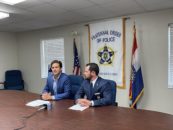Galloway says allegations of conflicts of interest not taken seriously by Greitens administration
JEFFERSON CITY, Mo. — Finding conflicts of interests and biased treatment between two state agencies and a vendor, the state auditor has turned over records from her audit to the FBI and the state’s attorney general.
Missouri State Auditor Nicole Galloway released a detailed report Thursday on the Missouri Department of Transportation and the Missouri State Highway Patrols interactions with HELP Inc., a nonprofit that provides weigh-in-motion technology to Missouri truckers. The report outlines a series of questionable communication, preferential treatment, and ethical violations.
“We reached out to the state auditor’s office weeks ago and confirmed that HELP Inc. is not the subject of the audit,” said Karen Rasmussen, Chief Executive Officer of HELP Inc.
The audit was launched in April 2017 following media stories of potential conflicts of interest and whistleblower reports.
“It appears the Greitens administration didn’t take these reports seriously,” said Galloway. “It wasn’t until our audit work began to raise uncomfortable questions that some of these problems were addressed.”
Missouri State Highway Patrol announced in May 2017 that an internal review was conducted and that its employees would no longer serve on the board of HELP. Audit staff was informed the review did not include a written report but resulted in records being provided to the Attorney General’s Office. There was no documentation of changes to internal policies as a result of the review.
Not until November 2017 — while audit work was ongoing — did MoDOT launch an internal review. As a result, in January 2018, MoDOT provided additional communications to auditors that include information not originally disclosed. In February 2018, MoDOT officials provided information to the Auditor’s Office on internal actions taken to discipline employees and an update to internal conflict of interest policies.
“It is disappointing that state officials and this administration need to be under the scrutiny of an audit before they act to protect taxpayers,” said Galloway.
Missouri, which has the nation’s seventh largest highway system, uses electronic weigh station technology to allow trucking companies to bypass traditional weigh stations and provide data to the state. For the past 15 years, this service has been provided by HELP Inc., a nonprofit that contracts to utilize public resources to do business within the state. Trucking companies pay HELP, Inc. a subscription fee to use the service.
In 2014, Drivewyze, a competitor to HELP, Inc., contracted with the state for a pilot program to provide a similar service. However, the Auditor’s report found that state employees with clear conflicts of interest showed preferential treatment to the existing vendor.
“This report outlines years of improper communications and actions that led to one vendor being unfairly favored over another.”
The 44-page report highlights a clear conflict of interest and preference of one company. There was a further lack of transparency in these relationships because three state employees failed to properly disclose expenses paid to them on their personal financial disclosures to the Missouri Ethics Commission. In two instances, the disclosures were later amended to include board membership and expenses paid by the nonprofit.
“This report outlines years of improper communications and actions that led to one vendor being unfairly favored over another,” Galloway said. “Just as concerning, is the appearance that these allegations were not taken seriously by state officials until much later as our work was bringing the details to light.”
The findings of the audit were forwarded to state and federal agencies.
“The Attorney General’s Public Corruption Team is actively investigating this matter. Civil servants who abuse their authority and fail to do what is in the best interest of Missouri citizens will be prosecuted to the fullest extent of the law,” Attorney General Josh Hawley said.
The complete audit report is available here.
The 44-page report includes communications, actions, and such of Jan Skouby (former MoDOT Motor Carrier Services Director), Bret Johnson (former MSHP Major, then Colonel), and Scott Marion (current MoDOT Motor Carrier Services Director) — all three served on HELP board. Another MSHP employee, former Major Greg Kindle, also participated in decisions regarding these bypass services.
Email exchanges of note:
Within 22 minutes of receiving a document highlighting the benefits of the Drivewyze system on November 20, 2013 — which was sent to MSHP ahead of forthcoming meeting to discuss the Drivewyze preclearance bypass system — Johnson forwards the email to Karen Rasumussen, President and CEO of HELP, indicating: “DrivewyZe [sic] is lobbying my colonel [sic] FYI! Can you have Mark [Doughty] or someone send me [HELP] talking points?”
“I’ve attached a couple of confidential documents that won’t be officially released until after the noon press event this Wed., but I thought I’d risk getting fired to let you all have some idea of what this event is really all about. (I don’t think they’d really fire me!),” Marion wrote in an email on June 1, 2015. He emailed officials at HELP confidential documents.
Responding to an email on June 14, 2016, regarding a MoDOT Request for Proposal, Marion added “. . . You know you make me laugh. Any mention of PPP or P3 [Public Private Partnership] and you break out into hives! I do the same thing when the word Drivewyze is mentioned!”
On December 20, 2016, Kindle sent HELP his resume from his MSHP email account.
On April 7, 2017, Rasmussen emailed MoDOT Director McKenna: “Several days ago, Drivewyze submitted a “proposal” to us through Sen. Schatz. The Executive Committee’s [HELP] decision was made before the latest tactic – which was to provide a reporter with untruths and innuendos – so the chairman revised the letter this morning.” McKenna responded, “In the midst of an active procurement, I do not believe communications between us such as your email are appropriate.”
From public to private employee
In October 2013, Skouby retired from MoDOT where she was Motor Carrier Services Director. Just 7 months later, in May 2014, she was hired by HELP as a regional director of Midwestern states.
Johnson retired from the MSHP on February 1, 2017. After his retirement, Johnson filed an Article of Organization with the Missouri Secretary of State’s Office on February 24, 2017, forming a consulting firm effective March 1, 2017. HELP contracted with Johnson’s consulting firm in March 2017.
Major Kindle retired from the MSHP on February 1, 2017, and was hired by HELP as a Regional Director in March 2017. His region does not include the state of Missouri and the audit identified no subsequent communications from Kindle to state employees.
“While I hope to someday have a more formal role with HELP, I pledge to do everything I can communicate the facts about the good work and unquestioned ethics of HELP,” Marion wrote in a May 10, 2017 email to Rasmussen.
Missouri law requires former state employees to wait at least a year after leaving state employment before performing any paid service in which they would attempt to influence decisions of an agency where they had supervisory duties. Former state employees also are prohibited from performing any paid service regarding any decision in which they were directly concerned or personally participated while they were employed by the state.
Drivewyze cancellation timeline
On May 4, 2016, Colonel Johnson sends a letter to Drivewyze providing written notification of the cancellation of the Drivewyze pilot project effective August 15, 2016. The letter provided no explanation of the reasons for the cancellation.
On May 25, 2016, Heath (Drivewyze) emailed Major Greg Kindle, Captain Earney, and Lt. Kelley, all of the MSHP, and proposed installing computer monitors at weigh stations and providing onsite refresher training. He also indicated in the email message that the Attorney General’s office was reviewing the state’s WIM data access rights. Major Kindle responded, “At this time, the Missouri State Highway Patrol does not wish to move forward with the installation of the Drivewyze monitors at our sites.”
On July 13, 2016, Colonel Johnson receives an email message from Rasmussen forwarding him information from her communications with Drivewyze to help MSHP’s efforts to end the Drivewyze pilot project. From Rasmussen: “FYI, Brian [Heath] stated that MSHP’s only issue with Drivewyze was not having the WIM data.”
Colonel Johnson forwards this email message to Major Kindle indicating, “Please have CVE [Commercial Vehicle Enforcement division] make me a list of issues we had with Drivewyze [sic]” which resulted in an interoffice communication dated August 12, 2016.
On July 14, 2016, Marion responded to an email message from Kelly Ray (MoDOT) who prepared a list of issues the department had with Drivewyze. Ray asked Marion to review the list before he sends it to Kevin Kelley (MSHP Lieutenant). Marion’s reply included, “. . . Let him know I’m trying to get the list from Karen [Rasmussen, HELP] of issues nationwide.”
On August 30, 2016, the MSHP sent Drivewyze a letter documenting reasons for canceling the Pilot Program.
Lobbying other states
In June 2015, Marion actively worked to get other states on board with HELP. He emailed employees of HELP and PrePass thanking them for participating in the MoDOT/MHTC communication launch, adding “Next project: getting Minnesota on board!”
On August 7, 2015, Marion received a request from Christopher Oliver to provide a reference for HELP regarding an invitation for bid request from the state of Texas for an electronic clearance system. Marion replied “Thank you for asking and yes, I would very much like to be a reference for HELP/PrePass. Let me know if I need any coaching about special circumstances or concerns surrounding the Texas bid that would be helpful for me to emphasize if they contact me.”
An effort was almost made in Kansas to promote HELP by Missouri state employees.

Alisha Shurr was a reporter for The Missouri Times and The Missouri Times Magazine. She joined The Missouri Times in January 2018 after working as a copy editor for her hometown newspaper in Southern Oregon. Alisha is a graduate of Kansas State University.











